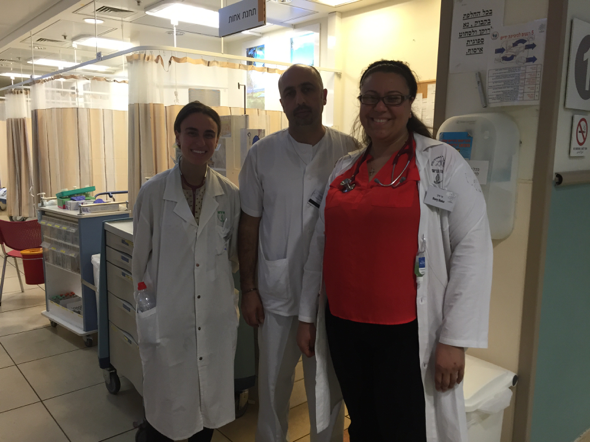For ER Rotation, PA Students Travel to Israel
To fulfill their advanced elective rotation, SHS students traveled to Israel to treat the wounded at the Medical Center of the Galilee in Northern Nahariya.

Victoria Ciano and Sherry Shaker, SHS ’16, were itching to travel abroad for their last rotation, an advanced elective—ER.
After working out the logistics and details with Clinical Coordinator Mary Showstark, Victoria and Sherry arrived in January 2016 at Touro’s affiliate hospital in Israel: the Medical Center of the Galilee in Northern Nahariya. As the second largest hospital in Northern Israel, treating 400 patients a day, the Galilee Medical Center sits on the outskirts of Nahariya. As it is close to the Lebanese border, the hospital welcomes all patients, regardless of race or religion.
We spoke with Sherry and Victoria about their memorable rotation.
What were some of the challenges of doing your ER rotation abroad, in Israel?
Sherry: Although I did speak some Arabic, the language barrier was definitely hard. But because it was difficult to communicate, we had to rely more on our history-taking and physical exam skills, rather than machine and tools. So if I couldn’t communicate with a patient, I could point at their head, to see if it hurt, and I could listen to their heart, breathing, abdomen and see if anything is abnormal. Physical signs—now that’s a universal language.
Victoria: I agree with Sherry. Some of them brought their relatives to help translate…but trying to communicate was still stressful. The advantage was, though, that in order to fully understand the patient’s concerns and complaints, I did more full medical workups there than I’d ever done. We were forced to utilize, and refine, our history and physical exam skills.
Can you give us an example?
Victoria: I once had a patient who was trying to explain a chronic problem he had. I wasn’t understanding what he was trying to tell me, so after a while he just pointed to his chest and said, in broken English, “Just listen, you’ll see what I mean.” So I percussed his lungs and I figured out that he had classic pneumonia.
Besides the language barrier, what else was different, or unusual, here?
Sherry: The hospital didn’t have the same resources and supplies that we were used to. So, for example, we didn’t have a tourniquet, we used a glove. No band aids— we used cotton balls. They had a different type of EKG machine, and a different method of taking the test, which was cool to use for us. The whole experience trained us to act quick, work with less, be resourceful.
Victoria: It was more organized than I assumed, though. I was very impressed with their trauma unit. I was also shocked to see how much American medicine they practiced. They used the same books we used, the same English billing codes, the same medical jargon. In the babble of all their Hebrew, I’d catch the word “heart attack” or “CVA” and I understood what was happening to the patient. Another interesting thing about the hospital here was that the emergency room was a fully functioning “bunker ER.” During the 2006 Lebanon War, a missile hit the hospital, and parts of the building were destroyed. After the incident, the hospital revamped the ER to make it fully bomb-proof. Something else that was really interesting was that the hospital had medical clowns that would come into the ER to cheer up patients. They weren’t volunteers, though— they went through schooling on how to interact with patients as a method of healing. It was interesting to watch, and from what we saw, many patients old and young enjoyed interacting with the clowns.
What were your hours like?
Victoria: It was a jam packed month. Usually, 8-4, but one night I stayed with Sherry to see if any Syrian refugees or Arab Israelis were coming in. Because it was so busy, they really needed our help.
Sherry: That was a double shift, 8 am till 11 pm.
Tell us about the refugees you assisted.
Victoria: The most eye-opening experience was watching the doctors take care of Syrian soldiers and Syrian refugees. Because this was the hospital closest to the border, at all hours of the night Syrian refugees were brought in, and they were taken to the underground, bomb-proof emergency room. A lot of them had amputated limbs, some of their faces were missing. I accompanied one of the orthopedic doctors down there for two days. I’d watch him do wound checks, re-bandages…It was a really incredible experience.

